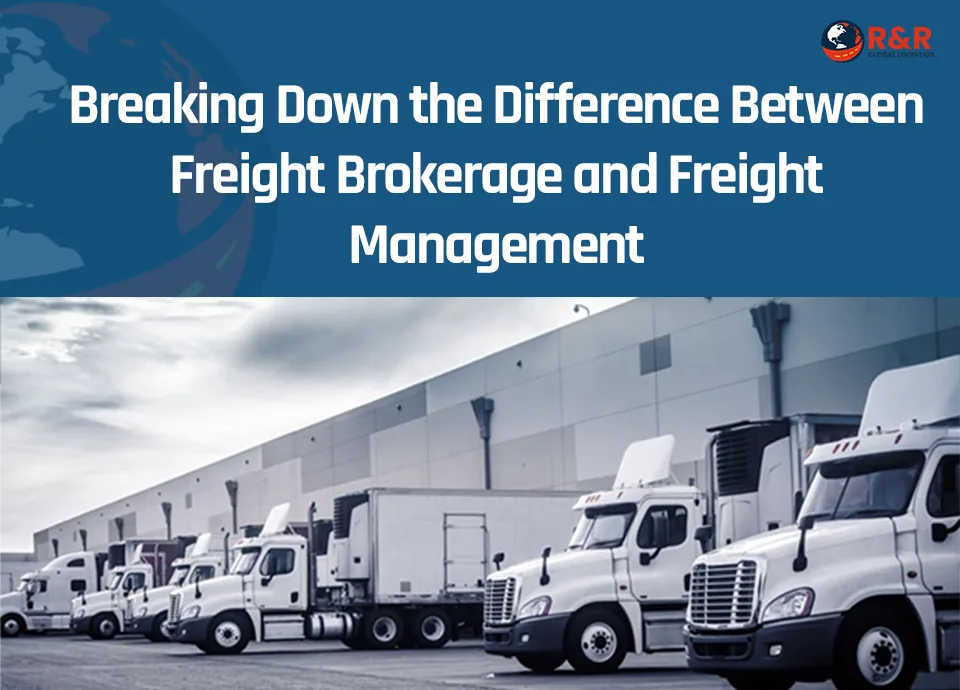Introduction
In the world of logistics, the terms “freight brokerage” and “freight management” are often used interchangeably — but they refer to very different solutions. For shippers looking to improve supply chain efficiency, reduce costs, and increase visibility, it’s essential to understand these differences and determine which is the better fit for your operations.
This blog will break down freight brokerage and freight management, their roles, key features, pros and cons, and how to choose the right solution based on your needs.
1. What is Freight Brokerage?
A freight broker acts as a middleman between shippers and carriers. Their primary job is to connect businesses that need goods shipped with carriers who can move the freight — quickly, cost-effectively, and compliantly.
Key Responsibilities:
- Sourcing and booking carriers
- Negotiating rates
- Managing load tenders and pickups
- Ensuring documentation is accurate
- Tracking and tracing freight
When Freight Brokerage Makes Sense:
- You need on-demand capacity for spot shipments
- You’re shipping irregular or one-time loads
- You want flexibility without long-term contracts
- You have internal resources for supply chain oversight
Benefits:
- Access to a wide carrier network
- Cost-competitive rates via market leverage
- Quick turnaround for loads
- No commitment or infrastructure required
2. What is Freight Management?
Freight management is a more comprehensive, ongoing logistics solution. Rather than just finding carriers, freight managers take a strategic approach to oversee your entire shipping process — from planning to execution to post-delivery reporting.
Key Responsibilities:
- Route optimization
- Carrier vetting and performance analysis
- Freight audit and payment
- Inventory coordination
- KPI reporting and continuous improvement
- Technology integration (TMS, APIs)
When Freight Management is Ideal:
- You’re managing high shipment volumes
- You need end-to-end visibility and control
- You want to reduce freight spend long-term
- You lack internal logistics staff or tech infrastructure
Benefits:
- Strategic cost savings
- Improved service levels
- Proactive problem-solving
- Centralized logistics coordination
- Technology-enhanced transparency
3. Comparing the Two: Freight Brokerage vs Freight Management
| Feature | Freight Brokerage | Freight Management |
|---|---|---|
| Scope | Transactional | Strategic & Operational |
| Engagement | Load-by-load | Long-term partnership |
| Visibility | Basic (track & trace) | Full (KPI dashboards, analytics) |
| Technology | Optional | Often includes TMS, integration |
| Problem Solving | Reactive | Proactive |
| Support Level | Minimal | High-touch, dedicated teams |
| Best For | Flexible capacity, quick loads | Holistic supply chain improvement |
4. Which One is Right for Your Business?
Go with Freight Brokerage if:
- You only ship a few times a month
- You want fast service with minimal commitment
- You prefer to manage logistics internally
Go with Freight Management if:
- You’re shipping frequently or at scale
- You’re seeking consistent, optimized performance
- You want strategic cost reduction and visibility
Many businesses start with freight brokerage and grow into freight management as their needs become more complex.
5. Can You Have Both?
Absolutely. In fact, many logistics providers (like R&R Global Logistics) offer both services under one roof. You might use brokerage for overflow or irregular loads, while relying on freight management for regular lanes and strategic oversight.
6. Final Thoughts
Freight brokerage and freight management serve different needs, but both are crucial in modern supply chains. Understanding the difference can help you align your logistics operations with your business goals — saving time, reducing risk, and improving service in the process.
At R&R Global Logistics, we offer both brokerage and management services tailored to your business. Whether you’re looking for a reliable carrier tomorrow or a strategic partner for the next five years, we’re here to help.

